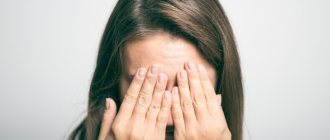Published: 10/11/2018 Updated: 06/23/2021
With prolonged exposure, stress triggers a cascade of physiological reactions that negatively affect health. The heart rate and breathing rate increase, and body temperature rises. All this can lead to problems with the heart and blood vessels, exacerbation of chronic diseases, and decreased immunity.
Learning to cope with the normal stresses of life will help you maintain strength and a positive attitude for productive work and communication with your loved ones. Below are recommendations to help you get rid of stress.
Methods for dealing with stress
We live in a world of stressful situations. Stress is becoming a common part of modern life. Nevertheless, stress can negatively affect the body, leading to increased fatigue, decreased immunity, decreased performance, etc.
There are many methods of stress correction, and the task is to choose those that would correspond, on the one hand, to individual characteristics, and, on the other hand, to the real conditions existing in a given place and at a given time.
You can start your choice with simple ways to relax and reduce tension.
To complete, you need to allocate only 10-15 minutes and find a place where no one will be distracted. Relaxation is achieved by settling into a comfortable position and closing your eyes, and slow breathing is also calming.
1. Breathing technique for relaxation
Proper breathing allows you to quickly get out of a stressful situation, so you can master this technique and try to apply it in stressful situations. While performing breathing exercises, try to focus on the breathing process itself, without being distracted by extraneous thoughts.
Take a comfortable body position and start breathing through your nose
Close your eyes and concentrate on how the air passes through your nose
· Take a deep and slow breath and try to feel the slight coolness of the air
Hold your breath for a few seconds
· Exhale calmly and try to feel that the air coming out is already warm
· Perform this sequence several times until the tension is relieved
2. Relaxation Visualization Technique
One of the most effective ways to relieve stress is to switch your attention.
· Take a comfortable body position and close your eyes
Take a few deep breaths in and out
· Imagine that you are in a calm, quiet and pleasant place where you can easily relax (for example, in the forest, on the beach, etc.)
· Maintain the image you are imagining and concentrate on the feeling of relaxation, try to intensify it and immerse yourself in it as deeply as possible
· Detail the image, imagining it in all details (birds singing, or the sound of waves, or coolness, or the warm rays of the sun, etc.)
Slowly open your eyes and breathe slowly for a few minutes
From the proposed methods of stress relief, choose the one that suits you best and use it when a stressful situation arises.
Don’t forget also about general recommendations for reducing stress:
sleep at least 8-9 hours a day
· rejection of bad habits
· physical activity
· proper nutrition
STRESSOVIT
– a complex of natural plant components and magnesium with vitamin B6, which help reduce psycho-emotional stress, relieve stress, improve the functioning and restoration of the nervous system, improve overall well-being and increase performance.
The optimally selected composition of STRESSOVIT® helps to increase resistance to stress.
Convenient administration: just 1 capsule STRESSOVIT® for 2-3 weeks.
Live stress-free with STRESOVIT®!
Dietary supplement NOT A MEDICINE
How to get out of severe depression?
The first step is to contact a specialist psychiatrist or psychotherapist. The second is the implementation of his recommendations. Good specialists can be found in clinics that are licensed and certified to provide assistance in the areas of psychiatry and psychotherapy.
Most depressive conditions can be treated at home. After all, placement in a psychiatric hospital is already a psychological trauma for many. A significant proportion of those who suffer from severe depression do not seek help precisely because they are afraid of ending up in a closed psychiatric ward! Opportunities should be found to provide active treatment for severe depression outside the hospital.
One of the solution options is treatment in a day hospital: the patient comes to the clinic, where a doctor will talk with him for an hour or two, procedures will be performed as prescribed by the doctor (physical treatment, IVs, biofeedback therapy), a psychotherapeutic session will be held, and then you can return home.
Hospitalization is required only in cases where behavioral control, intensive pharmacological treatment is needed, and when there is a risk of suicidal behavior.
Overcoming depression:
- Limit yourself. Don't expect to complete everything you were able to do before. Make a realistic work plan.
- Don't give too much importance to all your negative thoughts, such as self-blame or expecting failure. Such thoughts are part of depression. They will disappear as soon as you get rid of depression.
- Participate in activities that give you pleasure or give you a feeling of achieving a goal.
- Avoid making important decisions while depressed. If you need to make this decision, ask someone you trust to help you.
- Avoid drinking alcoholic beverages and drugs. Both make depression worse, and both can interact dangerously with the antidepressants you are taking.
- Physical activity appears to cause chemical reactions in the body that improve your mood. Exercising 4 to 6 times a week for at least 30 minutes is an excellent achievement. However, even less activity can be beneficial.
- Try not to be disappointed. It takes some time for you to be completely free from depression.
How is depression treated?
Depression is treated with medication or a special type of counseling called psychotherapy. Sometimes these methods are combined.
What about drug therapy?
Several types of medications can be used to treat depression. These drugs are called antidepressants, and they have proven themselves very well. These drugs correct the chemical imbalance in brain cells that leads to depression.
Antidepressants work differently for different people. Each of them also has its own side effects. Therefore, if one of the antidepressants is not suitable for you or is not effective enough, it is quite possible that another drug from this group will help you. Improvement may occur after 1 week of treatment with an antidepressant, but the full effect is usually achieved after 6 to 8 weeks of treatment. Side effects usually occur at the beginning of treatment, but usually go away after a few weeks.
How long should I take the medications?
The length of treatment depends on the type of depression you have. Your doctor will likely prescribe you a course of therapy lasting 4 to 6 months or more. The duration of treatment should be sufficient to reduce the risk of relapse of depression. Be sure to discuss all aspects of your drug treatment with your doctor.
How can depression be diagnosed?
If you have symptoms of depression, be sure to tell your doctor about it, this is the only way you can get effective help. Don't think your doctor can tell you're depressed based on your appearance. The sooner you seek help, the faster you will get rid of depression.
If you tell your doctor how you are feeling, he or she may ask some clarifying questions about your symptoms, your health, and your family's medical history. Your doctor may also order some tests and perform a general examination.
Neuroleptics
When trying to classify antipsychotics, scientists primarily rely on their chemical structure:
- aliphatic phenothiazines - drugs whose antipsychotic activity is weakly expressed, they are aimed at sedation (calm down, help to sleep);
- butyrophenones (popular haloperidol) are powerful antipsychotics that have almost no sedative effect, they stop hallucinations and delusions;
- dibenzazepines have mild side effects, are better combined with other drugs, but have almost no sedative effect, and are aimed at relieving psychotic manifestations;
- Phenothiazine derivatives relieve pain and are prescribed for damaged blood vessels and thrombophilitis.
Neuroleptics or antipsychotics are atypical or typical, long-acting or non-long-acting. Typical antipsychotics are outdated drugs that do an excellent job of relieving psychotic symptoms, but have a high likelihood of side effects. Atypical is a modern version of antipsychotics that reduces the risk of side effects to a minimum. Long-acting antipsychotics have a long-lasting effect, their effect is noticeable for 20-30 days. They are not taken daily.
Neuroleptics eliminate severe fear, anxiety, agitation, and improve sleep. They are used for severe psychotic depression, the dosage is low. Neuroleptics are prescribed more often to patients with psychoses combined with psychomotor agitation. Less commonly used for apathy and lethargy.
Prescribing antipsychotics to children is a controversial issue in psychiatry. There is a lack of evidence-based medicine on this issue. Therefore, antipsychotics are prescribed to pediatric patients, but rarely, with caution and in small dosages.
What is depression?
When doctors talk about depression, they are talking about a condition called major depression. Patients with major depression experience the following symptoms all day long, almost every day for at least 2 weeks in a row.
If you have depression, you may also have headaches, pain in other parts of your body, or problems with digestion or sex life. An older person with depression may have difficulty understanding simple messages or requests made to them.
Symptoms of depression:
- lack of interest in activities that were previously enjoyable.
- Feeling sad or empty.
- Tearfulness, causeless crying.
- A feeling of inhibition or, conversely, a feeling of restlessness and the inability to sit in one place.
- Feelings of worthlessness or guilt.
- Rapid weight gain or loss.
- Thoughts about death or suicide.
- Difficulty thinking, remembering, or concentrating on current activities.
- Difficulty making everyday decisions.
- Trouble sleeping, especially in the early morning hours or feeling sleepy throughout the day.
- Constant feeling of fatigue.
- Feelings of emotional numbness, sometimes to the point of being completely unable to cry.
The effect of stress on the human body
In addition to the psychological impact, stressful situations have a strong impact on the body. And it cannot be called positive:
- Increased blood sugar levels. This reaction of the body activates internal defense mechanisms. But frequent releases of additional doses of glucose lead to the development of diabetes.
- Weakening of the immune system through decreased production of white blood cells. A person begins to get sick much more often for no apparent reason.
- Tight muscles that cannot relax begin to break down on their own. This also applies to some internal organs.
- Vasodilation, the source of which leads to disruption of the cardiovascular system.
- Metabolism failure. The accumulation of toxins that are not eliminated in a timely manner simply poisons us from the inside.
In addition, the person becomes irritable and aggressive. Normal sleep, necessary for proper rest, disappears. Anxiety and frequent headaches develop. All this together can lead to a complete loss of strength, which you will have to fight in the hospital ward.
Causes of stress
What can bring a person to the point where the stress trap is about to slam shut? There can be a lot of reasons, and some of them may seem completely harmless. There are 7 steps to stress that each of us goes through:
- Additional stress at work.
- Viewing unpleasant news.
- Disruption of planned events.
- Bad ecology.
- Collisions with aggressive people.
- Unsuccessful relationships.
- Mistakes at work or school.
These reasons gradually destroy our internal defenses. As a result, you begin to lash out at loved ones, thereby only exacerbating internal pressure.








